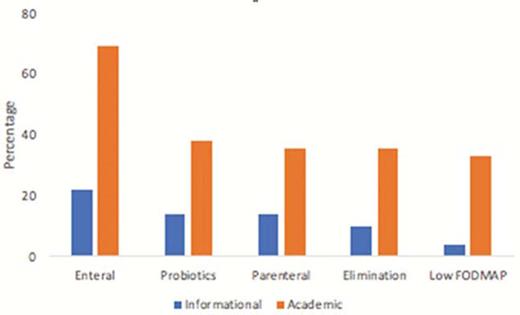-
Views
-
Cite
Cite
Scott Baumgartner, Vinay Rao, Ali Khan, Marie Borum, P018 INTERNET DIETS: ONLINE INFORMATION REGARDING NUTRITIONAL TREATMENTS FOR IBD, Inflammatory Bowel Diseases, Volume 26, Issue Supplement_1, January 2020, Pages S53–S54, https://doi.org/10.1093/ibd/zaa010.135
Close - Share Icon Share
Abstract
Nutrition is a vital component in the management of IBD and can be an effective primary therapy for many patients. Certain types of diets, including the Western diet, have been speculated to be associated with increased IBD risk or exacerbations. There are currently no specific dietary recommendations for IBD risk reduction. However, online resources may offer nutritional guidance to patients seeking information. This study evaluated specific nutritional and dietary treatment information for IBD on the Internet.
Google search engine was used to query “nutrition and inflammatory bowel disease” to obtain the first 100 websites. Websites that were non-accessible, duplicates, videos without transcripts, or evaluated animal models were excluded. Websites were categorized as informational or academic/professional. Websites were reviewed for discussion of specific nutritional treatments, acknowledgement of areas of uncertainty and references. Statistical analysis was performed using a two-tailed Fisher’s Exact Test with a significance value set at p <0.05.
89 (50 informational, 39 academic) met the inclusion criteria. No websites were commercial or personal. 49 (55%) websites discussed nutrition as a treatment modality. Enteral nutrition was discussed in 38 (77.6%), probiotics in 22 (44.9%), parenteral nutrition in 21 (42.9%), elimination diet in 19 (38.8%), and low FODMAP diet in 15 (30.6%). Academic resources discussed specific nutritional therapy more often than informational resources (82.1% and 45.0%, respectively; p=0.003) (Figure 1). Academic resources acknowledged areas of uncertainty more frequently than informational resources (64.1% and 30.0%, respectively; p=0.024). Academic resources cited references significantly more often than informational resources (80.9% and 10.6%, respectively; p<0.0001).

Diets Discussed in Online Resources
This study shows that the most commonly discussed nutritional therapy was enteral feedings (77.6%), followed by probiotics (44.9%), parenteral feeding (42.9%), elimination diet (38.8%), and the low FODMAP diet (30.6%). Academic websites discussed dietary options significantly more than informational websites. These results suggest that there is a paucity in consumer-oriented literature regarding nutrition in IBD. Academic websites are the primary online resources for information about nutrition in IBD, discuss areas of uncertainty, and offer references. As patients with IBD are increasingly utilizing the Internet for recommendations regarding disease management, it is important that both academic and informational online IBD resources provide comprehensive nutritional information to enhance patient education.
Cosnes J. Smoking, physical activity, nutrition and lifestyle: environmental factors and their impact on IBD. Digestive diseases. 2010;28(3):411–7.
- physical activity
- smoking
- parenteral nutrition
- inflammatory bowel disease
- diet
- enteral nutrition
- environmental factors
- digestive system disorders
- internet
- life style
- animal model
- nutritional support
- patient education
- probiotics
- disease management
- science of nutrition
- risk reduction
- fisher's exact test
- elimination diet
- information seeking
- fermentable, oligo-, di-, monosaccharides, and polyols
- search engine
- diet, western





